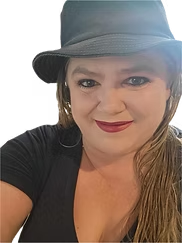Shield the Vulnerable: Beyond Compliance, Building Safety at Work

Shield the Vulnerable: Beyond Compliance — Training That Saves Lives at Work and Beyond
When human capital consultant Soleil Kline first began working with companies in Las Vegas, she thought most of her role would center around helping small and mid-sized businesses avoid costly compliance penalties. But what she discovered was far deeper: workplace violence, human trafficking, and active threats are not just regulatory issues—they are human ones.
In this episode of Shield the Vulnerable: Untold Stories, Soleil shares how going beyond compliance training can transform workplace culture, protect employees, and even safeguard families outside the office walls.
To many employees, HR feels like a department you only hear from when you’re in trouble. Soleil has spent her career working to change that.
“We called it People Services,” she explained. “Because we are advocates for the employee.”
From this perspective, training isn’t just a box to tick. It’s a way to build trust, prevent violence, and empower people to recognize danger before it’s too late.
Why Shortcuts in Training Cost More Than They Save
When workplace violence training is offered, many employers push to make it shorter and “easier” to complete. Ten-minute videos. A rushed quiz. Quick compliance.
But Soleil pushes back. “Any level of training is better than nothing, but cutting corners has a cost,” she said. “If an employee experiences workplace violence—or worse—saving a few minutes in training won’t matter.”
Instead, she encourages organizations to invest in short but engaging learning experiences, reinforced with quizzes, rewards, and executive buy-in. Because when leadership says safety matters, employees listen.
Safety as a Habit, Not a Checkbox
In the world of workplace safety, culture matters more than compliance. Organizations that treat training as a one-time event miss the point.
Soleil explains: “When employers go beyond compliance and start offering training on active shooters, human trafficking, and prevention, employees see that their employer actually cares about them—not just liability.”
This culture shift pays dividends:
• Employees feel safer.
• Engagement and retention improve.
• Families benefit, too—because safety training doesn’t stay at work.
Why This Training Goes Home With Employees
The lessons from workplace safety training aren’t confined to office walls. Soleil shared examples where employees used their training in grocery stores, on vacations, even at home with their kids.
“Human trafficking isn’t something that only happens overseas,” she reminded. “It happens here, in our neighborhoods, in parking lots, even in schools. Awareness training saves lives far beyond the workplace.”
For parents, the average age of entry into trafficking—just 13 years old—is a wake-up call. Training gives them tools to spot grooming behaviors, start hard conversations, and protect their children before predators strike.
The Long Game: Culture, Buy-In, and Real Change
Change doesn’t happen overnight. Soleil recalled working with a nonprofit that had high turnover and low morale. When leadership shifted to a model of true employee engagement—inviting feedback, valuing input, and investing in training—the organization transformed.
“Profits rose. Engagement soared. People wanted to work there,” she said. “And it all started with culture.”
That same principle applies to safety. If mid-level managers and executives model buy-in, employees stop seeing training as a burden—and start seeing it as a benefit.
What Employers and Employees Need to Remember
• Compliance training is the floor, not the ceiling.
• True safety requires leadership buy-in and consistent reinforcement.
• Survivors of violence and trafficking remind us: awareness saves lives.
• Training that follows employees home has the power to protect families and communities.
Conclusion
Soleil Kline never set out to be an activist. But like many who witness the realities of violence and exploitation, once she saw the truth, she couldn’t look away. Her mission is clear: move organizations beyond the checkbox, and make safety a living, breathing part of workplace culture.
About Soleil Kline
Soleil Kline is a strategist, advocate, and human capital consultant committed to transforming workplaces into safer, more empowered spaces.
From a foundation in HR leadership to guiding organizations through compliance and culture change, Soleil has built a career that merges technical expertise with a passion for people.
Her work goes beyond setting up HRIS platforms and preventing costly ACA or 401k penalties—she champions the human side of human resources, where safety, dignity, and engagement come first.
Through her lens, compliance isn’t just a checklist. It’s a chance to protect lives, prevent exploitation, and create organizations where employees feel seen and supported.
With clarity and conviction, she speaks on issues too often sidelined—workplace violence, human trafficking, and the urgent need for training that extends beyond office walls.
Her approach is both practical and profound: configuring systems, fixing compliance gaps, and at the same time challenging leaders to invest in culture, not just code.
Soleil Kline’s work is not only technical—it’s transformational.
With every project, she equips businesses to save time, reduce risk, and protect their most valuable asset: their people.
She isn’t just solving HR problems—she’s reshaping how organizations define care, safety, and responsibility in the modern workplace.

